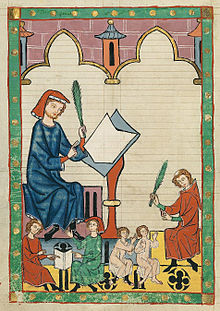Teacher
![]()
This article is about the person - for other meanings see Teacher (disambiguation).
![]()
This article or paragraph presents the situation in Germany. Help describe the situation in other countries.
A teacher is a person who educates others in a field in which he or she has a head start in skill, knowledge or experience. Since it is not a protected designation, in principle any person can call himself or herself so who is in a phase of imparting knowledge, skill, wisdom, training or education. "Teacher" can take on very different meanings in colloquial language as a job title or as an honorary title, and is a collective term for all kinds of teachers; these can each be more closely identified by a corresponding combination of words, such as school teacher, home teacher, dance teacher, or sailing instructor. Especially in modern official language, the gender-neutral term "teacher" is also used.
_040.png)
Teacher Lämpel in the story Max and Moritz (Wilhelm Busch, 1865)

The schoolmaster of Esslingen (depiction from the Codex Manesse, c. 1340)
Word Origin
The origin of the word lies in the Old High German lêrâri (from it Middle High German lêrære or lêrer) and in the Gothic laisareis with the meaning: one who makes knowing by tracing. The term has been attested since the 8th century. The nomen agentis teacher is a so-called feudal transfer from the Latin doctor to docere "to teach, to instruct". Although doctor was given a broader meaning in the High Middle Ages with the founding of the first universities in Europe, in that it henceforth also denoted the academic title of a scholar, schoolteachers were still called "doctors" in some cases until the late 19th century, regardless of their specific level of training. Since the 20th century, however, one can speak of a change in meaning, as the classical meaning disappeared completely. In addition, the teacher was also occasionally called praeceptor, magister or professor, the latter has survived to this day in some Romance languages for the designation of a school teacher, such as in the French professeur and in the Spanish profesor.
Term
Teachers in the broader and narrower sense
In contrast to the official title "teacher", the professional title "teacher" is not protected by law in Germany. The official title is subject to the protection of § 132a StGB. Moreover, the function of a teacher is not linked to a specific training, but primarily to an activity of teaching and instructing. Teachers therefore exist in pre-professional and professional fields: Anyone who is in a temporary systematic process of mediation exercises the function of a teacher and may in principle call himself or herself a teacher or a teacher.
Teachers in the broader sense can be anyone who takes on the role of a "teacher" over a period of time, including parents, older siblings, advanced students, mentors who instruct younger people in certain life skills such as moving around in traffic, sporting techniques, doing homework or dealing with other people. Self-taught "home teachers" or "private tutors" can also be classified here.
Teachers in the narrower sense are persons who teach and instruct professionally after professional training and appropriate examinations. They are then either self-employed (e.g. as driving instructors), in private schools (e.g. as Waldorf teachers) or in the state service (e.g. as grammar school teachers). A distinction is made between teachers who work freelance and those who are employed or civil servants.
The professionally practicing teachers can be differentiated and assigned by certain word combinations, for example:
- by type of school: primary school teacher, secondary school teacher, vocational school teacher, etc.
- by type of school: Waldorf teachers, Montessori teachers, private school teachers, etc.
- by subject: Maths teacher, German teacher, PE teacher etc.
- by sport: ski instructor, tennis instructor, dance instructor, etc.
- by musical instrument: Piano teacher, violin teacher, harp teacher, etc.
- by area of responsibility: subject teacher, class teacher, substitute teacher, etc.
- by subject area: Yoga instructor, meditation instructor, driving instructor, flight instructor, etc.
- according to the level of training: young teacher, old teacher, training teacher, etc.
Questions and Answers
Q: What is a teacher?
A: A teacher is a person who helps people to learn.
Q: In what place do teachers often work?
A: Teachers often work in a classroom.
Q: What are some different kinds of teachers?
A: Some different kinds of teachers include those who teach young children in kindergarten or primary schools, those who teach older children in middle, junior high and high schools, and those who teach adults in colleges and universities.
Q: What are some methods that teachers use to teach?
A: Different teachers use a variety of methods to teach, including explaining new knowledge, writing on a blackboard or whiteboard, sitting behind their desks on chairs, helping students with their work and marking students' work. They may also use a computer to write tests, assignments, or report cards for the class.
Q: What do teachers do to help students with their work?
A: Teachers help students with their work.
Q: What are professors?
A: Professors are teachers.
Q: What do teachers do with students' work?
A: Teachers mark students' work.
Search within the encyclopedia